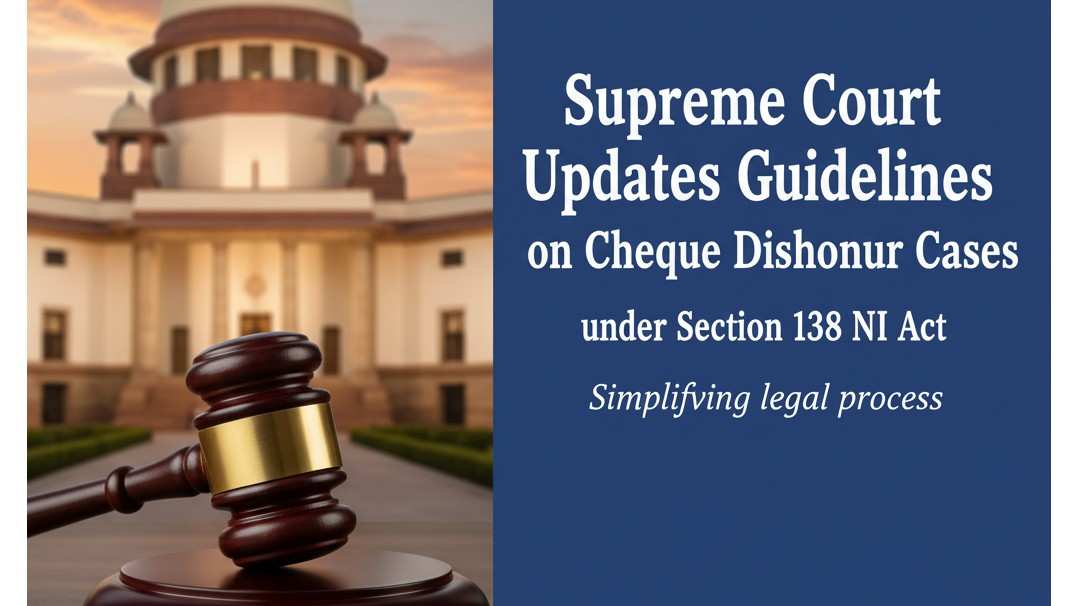Get the latest Supreme Court guidelines on Section 138 NI Act cheque dishonour cases, including modified compounding rules, summons service, online payment facilities, and steps for speedy resolution.
Supreme Court Modifies Guidelines for Cheque Dishonour Cases under Section 138 NI Act
The Supreme Court of India has introduced updated directions to ensure faster disposal of cheque dishonour cases under Section 138 of the Negotiable Instruments (NI) Act. This update addresses the backlog of cases and reinforces that the objective of the NI Act is to secure payment rather than impose punishment, thereby maintaining the reliability of cheques as trusted financial instruments.
Key Directions for Section 138 Cases
Service of Summons
- Summons should be served dasti (personally) in addition to standard methods.
- Courts may also use electronic service (email, WhatsApp, messaging apps) if verified details are provided by the complainant.
- An affidavit of service must be filed; false statements may attract legal action.
Online Payment Facilities
- Courts must provide secure QR codes or UPI links for payment.
- Summons must inform the accused that the initial stage payment is allowed for early settlement.
Complaint Synopsis
- Complaints must include a synopsis at the beginning of the file summarising key case details.
No Pre-Cognisance Summons
- The Supreme Court agrees with Karnataka HC (Ashok vs. Fayaz Aahmad, 2025) that pre-cognizance summons under Section 223 BNSS are not required.
Questions for the Accused
(Under Section 251 CrPC / Post-Cognizance Stage, NI Act)
Trial courts may ask the accused the following questions
- Do you admit the ownership of the cheque and confirm the signature on it?
- Do you admit that you owed a legally enforceable debt or liability to the complainant at the time the cheque was issued/delivered?
- What is your defense/explanation for the circumstances appearing against you, especially regarding the dishonour of the cheque?
- Do you admit or deny the legally enforceable liability? If you deny the liability, please state your specific defense.
- Are you willing to compound the case with the complainant at this stage?
Interim Deposits and Physical Courts
- Interim payments under Section 143A NI Act can be ordered.
- After summons service, cases should ideally be listed in physical courts to facilitate early resolution.
Evening Courts and Pecuniary Limits
- High Courts must set realistic monetary limits for evening courts handling Section 138 cases.
Monitoring Dashboards
- District and Sessions Judges in Delhi, Mumbai, and Kolkata must maintain dashboards tracking case pendency, disposal, and compounding rates.
Administrative Committees
- Chief Justices are directed to form committees for monitoring, appointing experienced Magistrates, and promoting mediation and Lok Adalats.
Modified Compounding Guidelines
The Supreme Court updated the Damodar S. Prabhu v. Sayed Babalal H. (2017) guidelines:
- Before Defence Evidence: Offence may be compounded without penalty.
- Post-Evidence, Pre-Judgment: Compounding allowed with 5% additional amount.
- Revision or Appeal: 7.5% additional amount.
- Supreme Court Stage: 10% additional amount.
Courts may also allow a plea under Section 255 Cr. P.C. / BNSS or Probation of Offenders Act if the complainant demands additional settlement.
Complaint Structure under Section 138 NI Act
I. Parties: Complainant and accused details.
II. Cheque Details: Number, date, amount, bank, and account number.
III. Dishonour: Date of presentation, dishonour memo, branch, reason.
IV. Statutory Notice: Date, mode, proof of delivery, response.
V. Cause of Action: Accrual date, jurisdiction, pending complaints.
VI. Relief Sought: Summoning of the accused, interim compensation, trial under Section 138.
VII. Filed Through: Complainant/Authorized Representative.
Download PDFs
- Download Supreme Court Guidelines PDF
FAQs On Supreme Court Updates Guidelines on Cheque Dishonour Cases
What are the latest directions for Section 138 NI Act cases?
Summons can be served dasti or electronically, online payment facilities are available, and compounding rules are updated for faster resolution.
Can interim deposits be made?
No, the Supreme Court clarified that pre-cognizance summons under Section 223 BNSS are not mandatory.
How can a cheque dishonour case be compounded now?
Depending on the stage of payment, courts may allow compounding with 0%–10% additional costs.

























